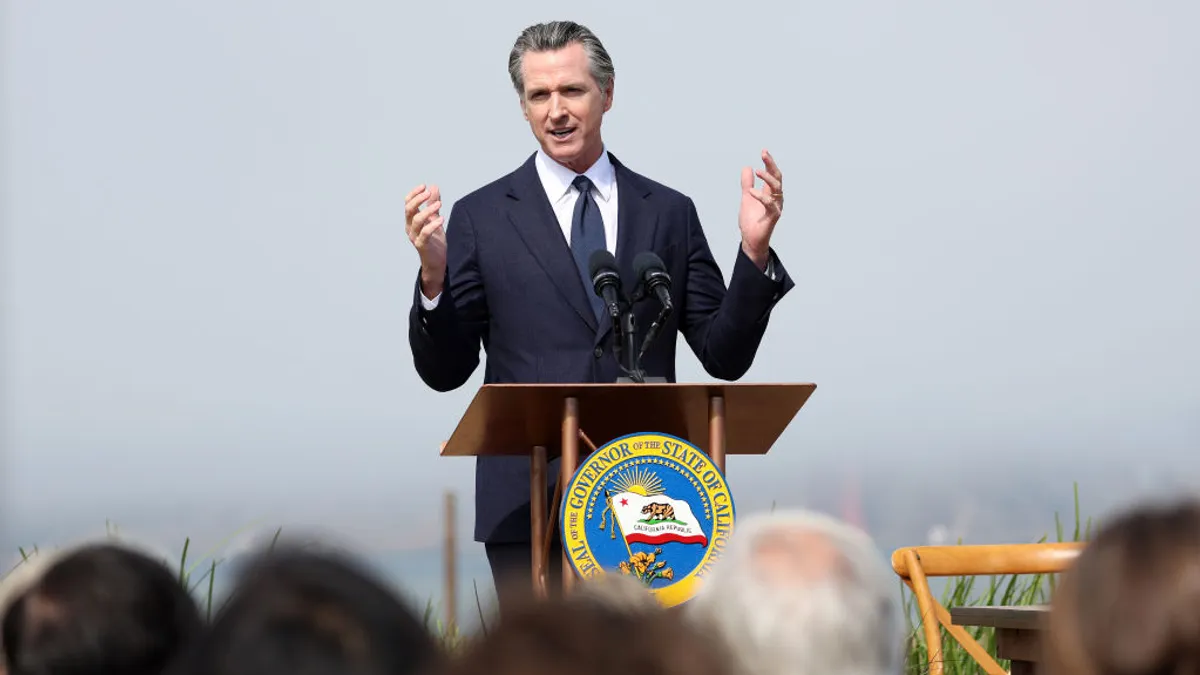Dive Brief:
- A federal judge refused to halt enforcement of California’s climate disclosure bills last week, despite a legal challenge put forward by the U.S. Chamber of Commerce and other business groups that alleges the bills violate First Amendment rights against compelled speech.
- In his Nov. 5 ruling, U.S. District Judge Otis Wright II denied the plaintiffs’ motion for summary judgment, noting the court required more information and “further development of the facts” to determine whether the climate disclosure rules — Senate Bills 253 and 261 — amount to compelled speech and are, hence, unconstitutional.
- Though Wright’s decision allows the state’s carbon emissions disclosure requirements to proceed as planned for now, his ruling granted the plaintiffs leave to file another request for summary judgment. Wright also said the First Amendment did apply to the challenged laws.
Dive Insight:
The U.S. Chamber of Commerce, along with a coalition of business groups, filed the lawsuit against the California Air Resources Board — the agency tasked with enforcing the state’s climate bills — in January. The suit argued that the state’s climate laws violate the First Amendment, the Supremacy Clause — which states federal laws and the Constitution take precedence over any conflicting state law — and constitutional limits on extraterritorial regulation. The complaint also criticized the state of California, alleging it is attempting to act as a national emissions regulator.
SB 253 would require business entities operating in California with annual revenues exceeding $1 billion to report their greenhouse emissions each year. Meanwhile, SB 261 would require business entities with revenues exceeding $500 million to publicly disclose their climate-related financial risks and countermeasures.
The Chamber’s legal challenge is also backed by the California Chamber of Commerce, American Farm Bureau Federation, Los Angeles County Business Federation, Central Valley Business Federation and Western Growers Association.
The defendants — which include CARB, the chair and executive officers of CARB, and the California Attorney General — argued the First Amendment does not apply to the laws and, even if it did, the laws would withstand strict or intermediate scrutiny.
However, Wright’s ruling last week confirmed that the First Amendment applies to both climate bills and that “there can be no dispute that the primary effect — and purpose — of SBs 253 and 261 is to compel speech.”
Despite this, the district court judge said to determine what level of scrutiny could be applied to these laws, “the Court needs a record on whether SBs 253 and 261 regulate a substantial number of companies that do not make potentially misleading environmental claims.” Wright concluded the district court did not have the information needed to perform a “fact-driven” First Amendment analysis at this time, which is the legal standard for summary judgment.
The ruling comes a few weeks after California Gov. Gavin Newsom signed Senate Bill 219 into law. The bill greenlit and amended SB 253 and SB 261, originally approved by Newsom last October.
The climate laws will mandate more climate-related disclosures from large companies operating in the state and push for more corporate transparency in terms of carbon emissions. While SB 219 includes a series of amendments to SB 253 and SB 261, it retained the original reporting deadlines laid out in both climate bills, with some businesses expected to make disclosures as early as 2026.











